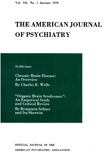Schizophrenic thought disorders: bizarre associations and intermingling
Abstract
The authors assessed bizarre verbalizations elicited from 37 schizophrenic and 16 nonschizophrenic patients. Interviews with subjects indicated that much bizarre schizophrenic language results from patients intermingling material from past and current experiences into their verbalizations. This intermingled material comes from many different problem areas rather than one central emotional complex. It does not arise from emotional overresponsiveness, overinvolved thinking, or delusional ideation. Two factors hypothesized as responsible for bizarre schizophrenic language are the schizophrenic's monitoring problems and difficulty maintaining perspective about his own behavior.
Access content
To read the fulltext, please use one of the options below to sign in or purchase access.- Personal login
- Institutional Login
- Sign in via OpenAthens
- Register for access
-
Please login/register if you wish to pair your device and check access availability.
Not a subscriber?
PsychiatryOnline subscription options offer access to the DSM-5 library, books, journals, CME, and patient resources. This all-in-one virtual library provides psychiatrists and mental health professionals with key resources for diagnosis, treatment, research, and professional development.
Need more help? PsychiatryOnline Customer Service may be reached by emailing [email protected] or by calling 800-368-5777 (in the U.S.) or 703-907-7322 (outside the U.S.).



